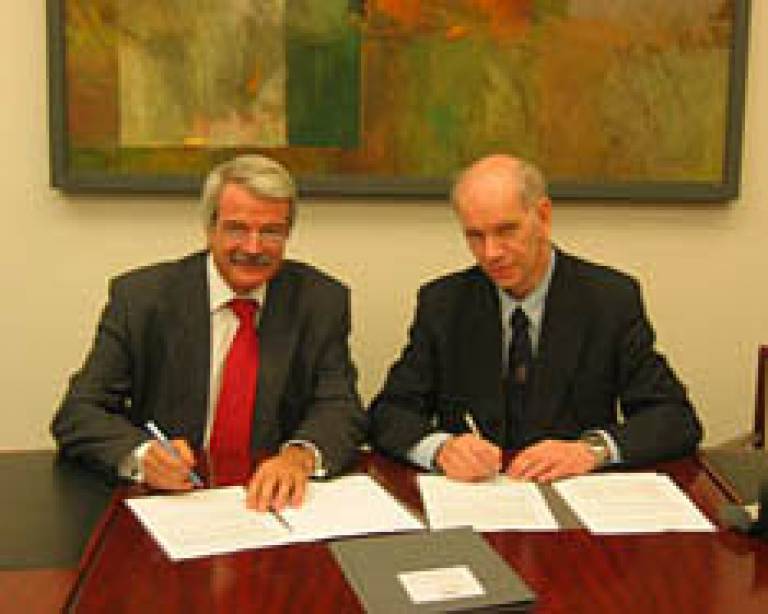Materials chemistry partnership
7 December 2005
UCL entered an Engineering & Physical Sciences Research Council (EPSRC) Portfolio Partnership in Synthesis, Design and Function in New Materials Chemistry in December 2005.
 It will draw together research teams from UCL Chemistry, the Royal Institution's Davy-Faraday Research Laboratory (DFRL) and Birkbeck College.
It will draw together research teams from UCL Chemistry, the Royal Institution's Davy-Faraday Research Laboratory (DFRL) and Birkbeck College.
This project is a new partnership between EPSRC and the collaborating institutions in the rapidly developing interdisciplinary field of materials chemistry - a field which draws on techniques and expertise from all areas of condensed matter science in order to synthesise, characterise and optimise materials with specific physical and chemical functionalities. The area lies at the heart of many current technologies and provides the basis for new materials creation and design.
The partnership is particularly timely as UCL, in collaboration with the DFRL and Birkbeck, has recently opened a joint Materials Chemistry Centre (MCC) in the 5* RAE-rated UCL Chemistry, supported by the Science Research Investment Fund. The centre provides core infrastructure for interdisciplinary chemistry and chemical-engineering research on advanced materials. The partnership will be a flagship project for the MCC.
The partnership aims to develop and exploit a unique combination of computational, synthesis and characterisation techniques with in situ probes of structure and properties, to promote an internationally leading programme in design and optimisation of functional materials. Materials under investigation include cements, microporous materials, amorphous solids, nanoparticles, electronic and magnetic materials, and ultra-hard phases. In collaboration with the EPSRC, the project will develop interactions with industrial partners, and disseminate science across a broad community extending to schools audiences and the general public.
Central objectives of the partnership will be: to exploit the latest high-performance computing and grid technologies; to model and design complex new materials; to develop methods and instrumentation for in situ synchrotron, neutron and spectroscopic observations of structure and function of materials during realistic operating conditions; to advance the understanding of materials chemistry and physics to extreme conditions as encountered inside functional devices and reaction chambers and extending to deep planetary interiors; to promote innovative and speculative science based on materials chemistry; to transfer the knowledge and expertise of the partnership to UK industry; and to promote, in partnership with EPSRC, outreach activities and public engagement with science including research on advanced materials.
To find out more about the UCL Chemistry, use the link at the top of this article.
Image: Professor Malcolm Grant, President and Provost of UCL, with Professor John O'Reilly, Chief Executive of the EPSRC
- Link:
- UCL Chemistry
 Close
Close

